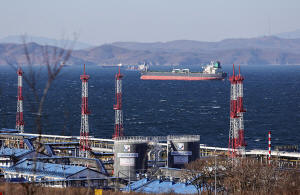U.S. sanctions hamper Russian efforts to repair refineries, sources say
 Send a link to a friend
Send a link to a friend
 [April 04, 2024] By
Robert Harvey [April 04, 2024] By
Robert Harvey
MOSCOW/LONDON (Reuters) - When engineers at Russian oil firm Lukoil
discovered a turbine had broken at their largest refinery on January 4,
they quickly realised the problem was far from trivial.
There was only one company that knew how to repair the
gasoline-producing unit at the NORSI refinery, located on the Volga
River, some 430 km (270 miles) east of Moscow. The problem was that the
company is American, according to five sources familiar with the
incident.
The firm, petroleum engineering multinational UOP, had withdrawn from
Russia after the country invaded Ukraine in February 2022.
"They (the engineers) rushed around to find spare parts and they
couldn't find anything," said a source close to Lukoil, who asked not to
be named because he is not allowed to speak to the media. "Then the
whole unit just stopped."
Four other sources said the unit - a catalytic cracker used to convert
heavier hydrocarbons into gasoline - has been out of production since
January and it was not clear when it could be repaired due to a lack of
expertise inside Russia. The KK-1 unit is one of only two catalytic
crackers at the plant.
As a result, the NORSI refinery - the fourth-biggest in Russia - has cut
gasoline production by 40%, according to two of the sources. Lukoil did
not respond to requests for comment for this story.
The Lukoil refinery is an example of wider problems in Russia's energy
sector where some oil firms are struggling in the face of Western
sanctions to repair their refineries, built with the help of U.S. and
European engineering firms, according to at least 10 Russian industry
sources.
The difficulties have been exacerbated by Ukrainian drone attacks that
have struck at least a dozen Russian refineries this year, the industry
sources said. The attacks forced Russian refineries to shut in some 14%
of capacity in the first quarter, according to Reuters calculations.

"If the stream of drones continues at this rate and Russian air defences
don't improve, Ukraine will be able to cut Russian refining runs quicker
than Russian firms will be able to repair them," said Sergey Vakulenko,
an expert on Russia's energy industry and non-resident fellow at the
Carnegie Endowment for International Peace, an international affairs
think tank.
Russia's top energy official, Deputy Prime Minister Alexander Novak,
said last week that the damaged NORSI facilities should resume
operations within a month or two, as Russian firms were working to
produce the spare parts needed.
He also said other Russian refineries have boosted production after the
drone attacks and there was no shortage on the local fuel market.
Russia's energy ministry did not respond to a request for comment.
Minister Nikolai Shulginov said on Wednesday all refineries would be
fixed by June, without providing further details.
The NORSI refinery, near the city of Nizhny Novgorod, has a capacity of
405,000 metric tons a month of gasoline or 11% of Russia's total.
The current outage would cost Lukoil nearly $100 million in lost
revenues a month, based on an average Russian gasoline price of $587 per
metric ton, according to Reuters' calculations.
Honeywell International Inc, the parent company for UOP, said in a
statement to Reuters it had not provided any equipment, parts, products
or services to the refinery at Nizhny Novgorod since February 2022, nor
to the independently-managed Slavyansk ECO refinery.
The Slavyansk refinery was hit by a Ukrainian drone attack on March 18
and caught fire briefly.
"We are actively working to identify and interrupt any possible
diversion of our products into Russia via third parties," Honeywell told
Reuters by email. The company said it complies with all applicable
export license requirements, sanctions laws and regulations.
The United States and its allies have imposed sanctions on thousands of
Russian targets since the invasion of Ukraine and around 1,000 companies
have announced their departure from the country.
Russia's export-focused $2.2-trillion economy has proved more resilient
to two years of the unprecedented sanctions than either Moscow or the
West anticipated.

[to top of second column] |

Fuga Bluemarine crude oil tanker lies at anchor near the terminal
Kozmino in Nakhodka Bay near the port city of Nakhodka, Russia,
December 4, 2022. REUTERS/Tatiana Meel

WAR OF ATTRITION
Western companies such as UOP and Swiss engineering group ABB have
supplied technology and software to all the 40 biggest refineries in
Russia over the last two decades, according to more than 10 Russian
industry sources. Each refinery has a combination of Russian and
foreign equipment.
ABB confirmed to Reuters it stopped taking new orders in Russia once
the war broke out in February 2022, and has no plans to return to
Russia once it has fulfilled its existing contractual obligations, a
spokesperson said. The company did not provide details of those
obligations.
None of the five sources suggested the turbine failure in January at
NORSI was a result of drone attacks. But the sources said the
problems at the plant only became worse after NORSI was hit for the
first time by Ukrainian drones in February when other pieces of
equipment were damaged, putting additional strain on the entire
refinery.
As in the United States, the price of gasoline is a politically
sensitive subject in Russia and authorities try to limit price
rises. Recent measures included imposing a ban on gasoline exports
for 6 months in February.
Ukraine says it attacks Russian refineries because it wants to
undermine the Kremlin's war machine by reducing state revenues and
cutting fuel to the army.
"Drones are tens, if not hundreds of times cheaper than the cost of
repairs, which is important in a war of attrition," said Vakulenko,
who was a former head of strategy at Russian energy major Gazprom
Neft. He left the firm and Russia days after the start of the
Ukraine war.
Russia is the world's second-largest oil exporter. It has rerouted
most of its crude and products exports to Asia and Africa since
Western nations imposed sanctions on Moscow.
Should Moscow face a steep decline in refinery output, it would be
forced to cut fuel exports in favour of crude, according to more
than 10 Russian oil traders.
Russia supplies crude to just a few large buyers, such as China,
India and Turkey, but its portfolio of fuels buyers is comparatively
broader as it can ship to smaller consumers without large refining
systems in Africa and South America.
Russia's refining industry dates back to the 1940s, when the United
States provided equipment under the lend-lease program during World
War Two.
After the collapse of the Soviet Union, Russian oil firms invested
tens of billions of dollars in upgrades with the help of firms such
as UOP and ABB.

UOP helped upgrade Norsi and Slavyansk ECO refineries. It did not
specify which other Russian refineries it has serviced, in response
to Reuters' questions.
The United States has imposed sanctions on companies around the
world, including in Turkey, to prevent the transfer of technology to
Russia.
Countries under Western sanctions such as Russia and Iran have long
managed to find loopholes to obtain spare parts for Western-made
equipment such as planes or cars.
But refining equipment is much rarer and more specialized; Western
firms have tightened checks to prevent Russia from importing spare
parts via third countries, one of the five sources said.
Two of the sources said Lukoil had asked Chinese companies to repair
the KK-1 unit at Norsi. The sources didn't name the Chinese
companies. Lukoil declined to comment when asked if it had
approached China.
"China has got the technology. But very often it would mean a full
costly replacement of the unit rather than a normal, cheap, regular
repair," one of the sources said.
(Reporting by Robert Harvey; Editing by Daniel Flynn)
[© 2024 Thomson Reuters. All rights
reserved.]
This material may not be published,
broadcast, rewritten or redistributed.
Thompson Reuters is solely responsible for this content. |